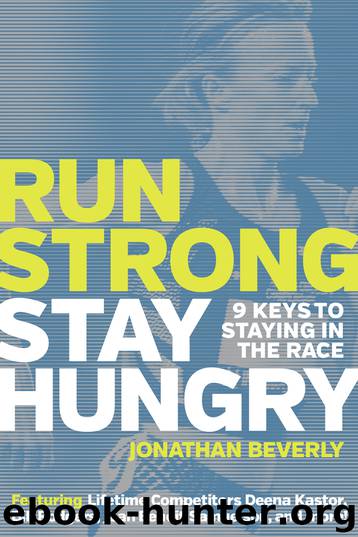Run Strong, Stay Hungry by Jonathan Beverly

Author:Jonathan Beverly
Language: eng
Format: epub
Publisher: VeloPress
SCALING THE CHALLENGE
Thriving through decades of running requires adapting. Adapting isn’t just important for your athletic survival. Psychologists consider “adaptive competence,” the ability to effectively respond to changing conditions, central to flourishing through the years.
In Successful Aging, German psychologists Paul and Margaret Baltes reflected on the specific adaptive challenges of getting old. “At first glance, aging and success seem to represent a contradiction,” they wrote. “Aging conjures a picture of loss, decline, and approaching death, whereas success connotes gains, winning the game, and a positive balance.”
That certainly agrees with most people’s view of athletics. Aging and success in sport are contradictory; you get old, you get slow, you get left behind.
Contrary to expectations, however, research has pointed out that many people do age successfully. Research bears out that you can be old and happy, and old and engaged. How? The central task, the Balteses wrote, is “acquiring successful strategies involving changes in aspirations and the scope of goals.” In other words, you can stay happy and engaged if you adapt what you aim for and redefine what constitutes being competitive.
Chapter 5 introduced the importance of balancing goals and success. Self-esteem, happiness, and the facilitation of flow all depend on keeping the challenge equal to your skills. To continue to care and strive for excellence—at any age—requires defining the parameters of success. Only one person can be the Olympic marathon champion or the world record holder. Only a few can make state in high school. Successful athletes learn to draw motivation and satisfaction from smaller but still very meaningful goals.
As we age, the added challenge is making peace with the fact that while goals in youth tend to expand, goals as we age will contract; that is, they contract if we hold to a limited view of goals—one confined to absolute numbers.
The key is finding a new goal or a context that means something to you and excites you. That goal will probably be different than it was when you were 20. “Forms and vehicles of ‘success’ in old age may be different from those in earlier phases of life,” the Balteses wrote. More poetically, Somerset Maugham wrote, “Old age has its pleasures, which, though different, are not less than the pleasures of youth.”
Download
This site does not store any files on its server. We only index and link to content provided by other sites. Please contact the content providers to delete copyright contents if any and email us, we'll remove relevant links or contents immediately.
Going Long by Editors of Runner's World(2362)
The Happy Runner by David Roche(2238)
Yoga For Dummies by Georg Feuerstein(1453)
Becoming Boston Strong by Amy Noelle Roe(1390)
Legacy by Kerr James(1294)
Winger by Smith Andrew(1263)
The Little Red Book of Running by Scott Douglas(1205)
Wodehouse At the Wicket by P.G. Wodehouse(1121)
Bowerman and the Men of Oregon by Kenny Moore(1119)
The Way of the Runner by Adharanand Finn(1104)
5050 by Dean Karnazes(1103)
Running Your First Marathon by Andrew Kastor(1077)
Swim, Bike, Run - Eat by Tom Holland(1051)
Blade Runner by Oscar Pistorius(1018)
The Coming Storm by Nigel McCrery(1010)
Spiked (Blocked Book 3) by Jennifer Lane(1001)
The Grade Cricketer by Dave Edwards(985)
The Amazing Test Match Crime by Adrian Alington(979)
The Shared Origins of Football, Rugby, and Soccer by Christopher Rowley(977)
